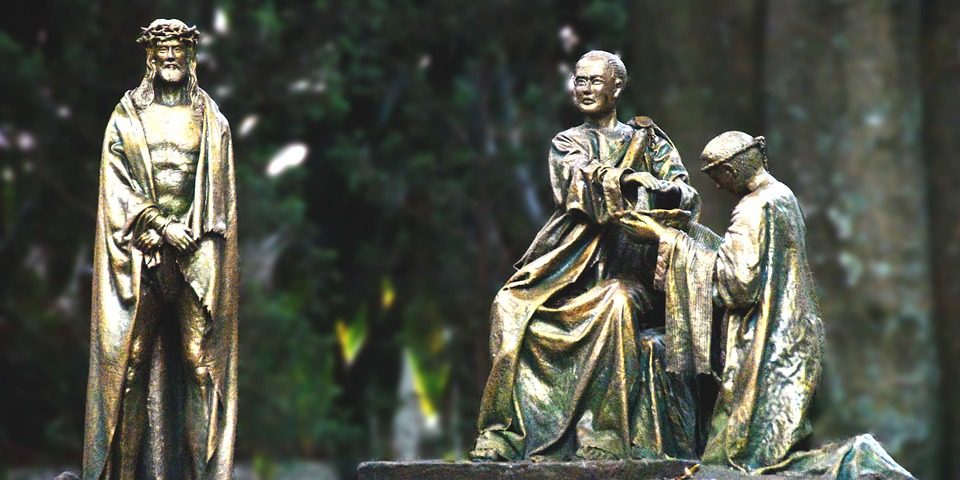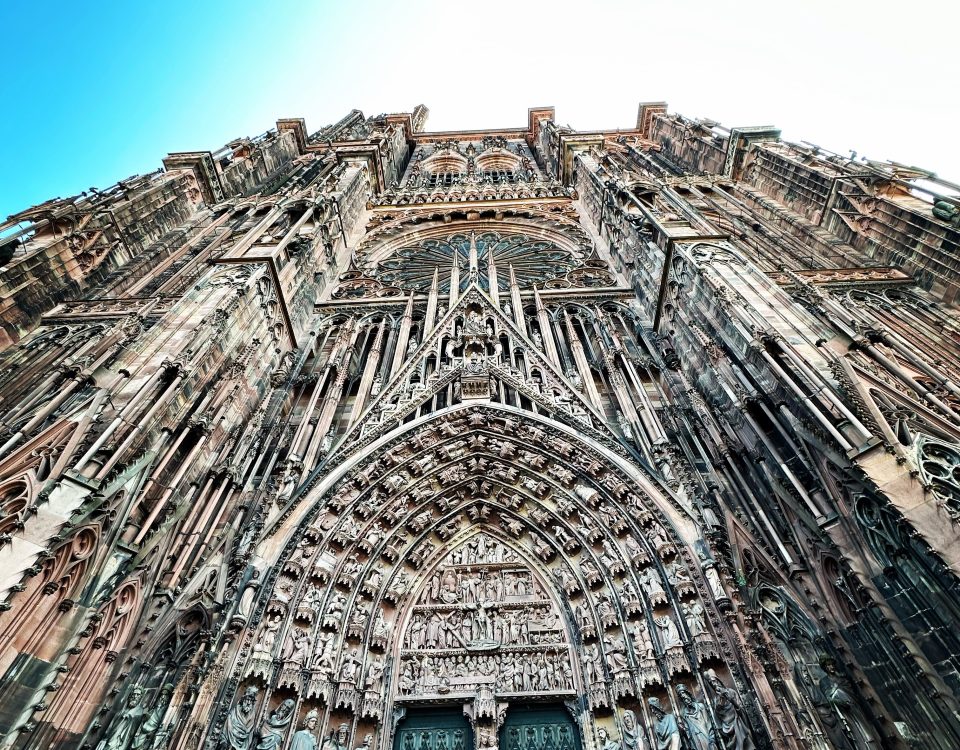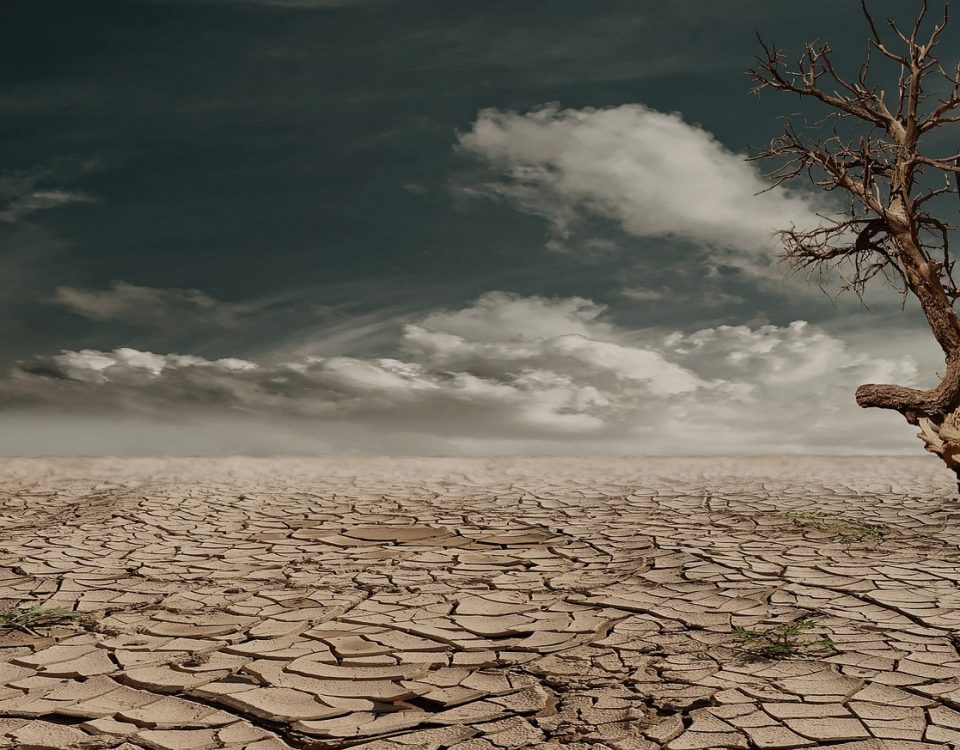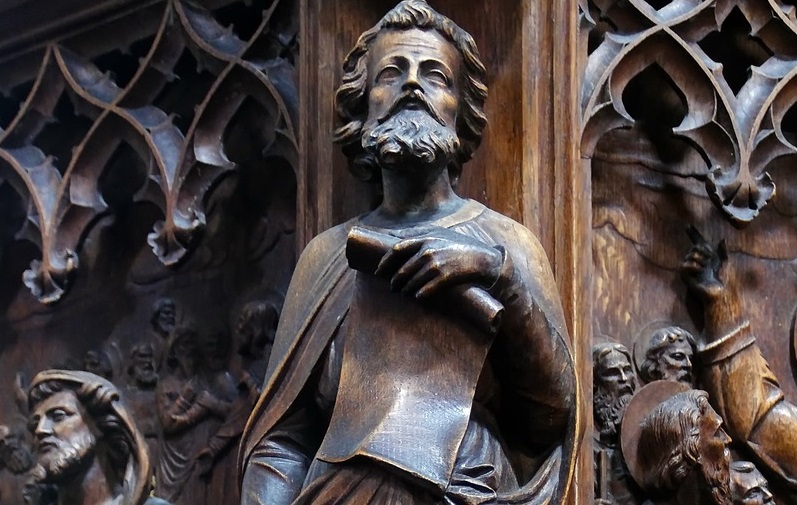Click here to listen to this homily.
It was on Mount Sinai long ago that God said, “I shall make you a kingdom of priests, a holy nation.”[1]
That was our beginning; it remains the decree of our destiny yet to come, the beginning our pilgrimage from the holy mountain to the celestial city, the city whose light is the Lamb, with trees with leaves of healing. It is the history of Israel, the history of the Church: this idea of the people of God, of elect and covenanted people who are also a sign and instrument of God’s providence and purpose. I’m talking, of course, of the Jews and us.
The idea was of a people rooted together in place, bound together in justice; the idea was to approximate as much as possible the harmonies of Eden: men and women in their cool walks with God, families in toil and love together, before Cain killed anyone or Jacob stole anything.[2] “[T]here shall be no one of you in need if you but listen to the voice of the Lord,” the ancient scripture read.[3] Again, at least that was the idea.
But these people of God wanted an earthly king, just like the pagans around them had kings. “But I brought you out of Egypt,” God said to them; why reject God, God asked them, by asking for an earthly king?[4] Such is the fraught beginnings of the kingdoms of Israel and Judah, those more bloody than blessed centuries scarring the history of God’s people.
Hence, the prophets. Elijah and Elisha, and the prophecies they spoke: they were the bearers of God’s history, not the kings, not their armies. Hence Isaiah’s dream of a servant, a different sort of servant, a servant filled with the Spirit who would bring justice to the nations, better than any king, but who would do so—mysteriously—through suffering. Pierced for our sins, crushed for our iniquity, healed by his wounds: that’s what Isaiah said.[5] That’s who would bring justice to the nations, a servant who suffered.
And so, we worship a crucified Jew, mocked in dress like a king—his thorny crown—and crushed by Roman political weakness and Roman military power. Because of Isaiah, you know why. We worship him, for we know—for the prophets taught us how to see—that his suffering and death are part of the peace he gives: that reconciliation born of his wounds, that peace he also called the kingdom of God, a kingdom of priests, a holy nation in Jesus Christ.
This is what the New Testament calls the “hidden” mystery: that in Jesus would be gathered together and bound in him in love Jews and Gentiles, all nations, everybody in faith.[6] This is the “multitude, which no one could count, from every nation, race, people, and tongue,” which John saw in his vision in the Book of Revelation.[7] It’s the Church, the body of Christ; it’s what Jesus called the kingdom of God; it’s exactly what he decreed on Sinai. And it’s the kingdom to which we belong—some of us by faith and sacramentally, some sacramentally but without faith, but with judgement. But that has always been so.
Saint Augustine called it the City of God. And it is woven, he said, into the Earthly City. This is merely an allegory, a way to explain two ways of loving. To love God rightly, to worship him rightly, is to belong to the City of God; to love the self, to the point of contempt for God and others, is to belong to the Earthly City.[8] One is a city of peace, the beginning of heaven begun at the altar of God; the other is a city of violence and the war of all against all.[9] The citizens of the City of God exist in the Earthly City, but they know the difference between the two. They know what they are meant to do in the Earthly City; they know they are to be Christians—to bear witness, to preach, and to suffer like Christ. They are to be people good for earthly peace, but without compromising the ultimate good of heavenly peace. They are meant to be the world’s mustard seed, wheat among weeds, yeast leavening the world, the blood of martyrs nourishing the spiritual gardens of the Church, peaceable and beautiful in an ugly world. But only if they remain as Christ: gentle, like a lamb led to the slaughter, peaceful not powerful, not seeking—like our forbears did so long ago—any earthly king. Because as so many martyrs said, laughing before princes and prefects: We worship the God of heaven and earth, not Caesar. No matter what.
Now, brothers and sisters, what I am talking about is, of course, what this feast of All Saints means to teach us, And because I think there is a divine providence to this feast falling, as it does, the Sunday before an election, especially an election so idolatrous for so many and bitter for all. Brothers and sisters, I know these are anxious times. I hear it from someone at least every day. A friend texted me just yesterday, “We are so anxious about the election.” I know; I get it. But what does the Church say to us about this anxiety, this election? On this feast of All Saints, it’s as if the Church is saying to us, simply: Remember the real kingdom. The saints, with the angels, with all the faithful all over the earth: that is the real kingdom; such is your first citizenship. As the ancient text puts it, “any motherland is a foreign country.”[10] “Our citizenship is in heaven,” Paul said.[11] “[Y]our ultimate allegiance is to the empire of eternity. You have a dual citizenry,” Martin Luther King said.[12] This is what so many religious and non-religious people both get wrong. Non-religious folk have no other citizenry; they can’t help but make the earth, their tribe, their nation something like a church (history is full of horrific examples of this); they can’t help but become extremists too. But, of course, religious people (especially in this country) do the same: they try to make America their church. Formed perfectly as the individualists we are—even many Catholics are perfectly Protestants in this—we can’t help but forget that America isn’t our church, the Church is. And so, we can sometimes make idols of our politicians, our politics idolatry, our political disagreements tinged with a strange, technically demonic hatred; both the right and the left does this and is doing it now. Because they believe more in America than the Church. It is our current ideology; for some of us, our heresy.
Which is why I will not make the mistake some clerics have of telling you who to vote for; I won’t even speak in that silly coded language clergy sometimes do. Get yourselves formed; vote if you want to. Do your best to be good citizens in what is still a very beautiful and great country; serve your country and when it’s just, fight for it. But don’t idolize it. Remember the real kingdom. Because the Church was here before America. It’ll be here after America too. And me telling you that shouldn’t scandalize you, that is, if you’re a Christian formed in the genuine faith of Jesus and his kingdom. If you walk with angels and saints.
And also, finally, a little spiritual advice. Perhaps it would be better for you to do what I have done; for me, it is what’s kept me sane in this insane world. And that is: mind your soul. Tend to the state of your soul. Let your soul fall in love and whisper love and kiss the feet, the hands, and the lips of Bridegroom. Love the Lord your God with everything. And love him in silence. For that’s one way to find the kingdom—even in these strange times—the kingdom you may either enjoy forever or lose forever. It just depends on what you really love and on the kingdom to which you want really to belong. Amen.
[1] Exodus 19:1
[2] Genesis 4:8; Genesis 25:29-34
[3] Deuteronomy 15:4-5
[4] 1 Samuel 10:17-19
[5] Isaiah 53:5
[6] Ephesians 3:6-12; Galatians 3:28
[7] Revelation 7:9
[8] Augustine, City of God 14.28
[9] Thomas Hobbes, Leviathan, Ch. 13
[10] The Epistle to Diognetus 5
[11] Philippians 3:20
[12] Martin Luther King, Jr., A Knock at Midnight, 41
© 2020 Rev. Joshua J. Whitfield










